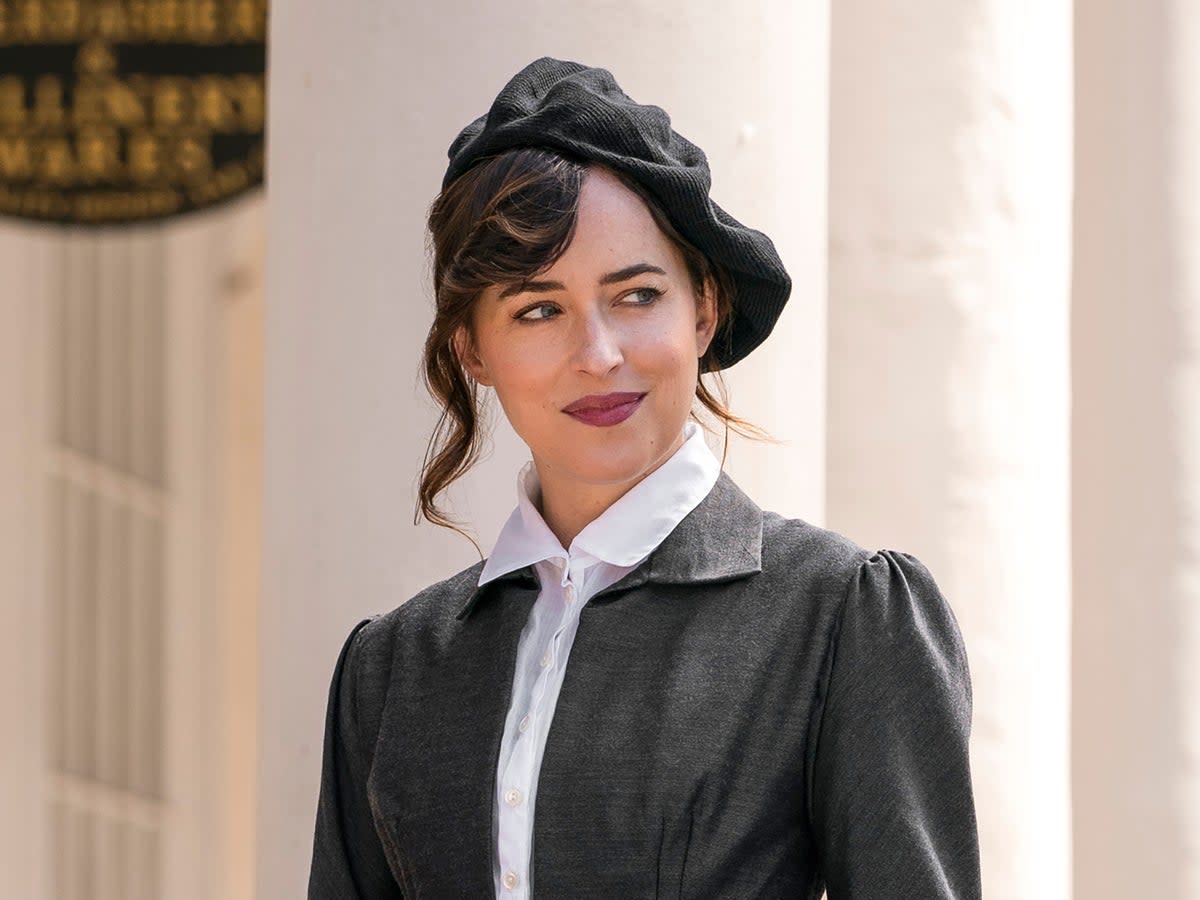Persuasion review: Dakota Johnson is woefully miscast in mortifying Jane Austen adaptation

Dir: Carrie Cracknell. Starring: Dakota Johnson, Cosmo Jarvis, Nikki Amuka-Bird, Richard E Grant, Henry Golding. PG, 109 minutes.
Autumn de Wilde’s Emma, from 2020, was such a moreish delight – it met Jane Austen’s wittiest and prickliest heroine on her own terms, defiantly selfish and loveable all the same. A confectionery construction of florals, pastels, and gilded frames, it found a way to satisfy modern tastes without betraying the authenticity of the Regency era. It remains one of the best modern adaptations of Austen’s work. I only bring this up because I can find no other way to describe Netflix’s take on Persuasion than this: it’s as if someone tried to recreate Emma from memory, but they’d only watched the film on a plane, and while the plane was experiencing extreme turbulence.
Let me try another way in. The film’s version of Anne Elliot (Dakota Johnson) – a 27-year-old teetering on the edge of spinsterhood, who still yearns for the handsome naval officer she was forced to turn down – has a compulsive habit of locking eyes with the camera. She looks at us whenever her spoilt sister Mary (Mia McKenna-Bruce) says something uncouth, or when she has to admit that her claims of being “single and thriving” are, in fact, a total construction. You see, she’s the kind of “messy woman” who drinks red wine from the bottle and cries in the bath. She’s Fleabag, if the only way you’d ever consumed Fleabag was through reaction GIFs posted on Twitter.
Above all, at no point during Carrie Cracknell’s directorial debut do you ever get the sense that anyone’s actually read Persuasion. For those with even the slightest affinity for Austen’s work, it’s vaguely mortifying to watch – seeing one of her most beautifully moulded protagonists, a sorrowful vessel hounded by the ghosts of lost love, stripped of her poetry and reduced to an Instagram caption about the pitfalls of millennial dating.
Revisionism itself is never unwelcome – and the rupturing of the fourth wall has already been applied to Austen, in Patricia Rozema’s charming take on Mansfield Park from 1999. But it’s pointless if there’s no purpose behind any of it. How exactly does the line, “it is said if you’re a five in London, you’re a 10 in Bath”, improve on Austen’s work or make it any more palatable to modern audiences? Or what about the comments on being “an empath” and focusing on “self-care”? These are all just marketing buzzwords. When Anne is reunited with Wentworth (Cosmo Jarvis), the man she once rejected, Austen writes: “Now they were as strangers; nay, worse than strangers, for they could never become acquainted. It was a perpetual estrangement.” In the film? We get: “We are strangers. Worse than strangers. We’re exes.”
Though Cracknell comes with a hefty portfolio of work on the Young Vic and Royal Court stages, there’s nothing here that seems to drive her work, and that of screenwriters Ronald Bass and Alice Victoria Winslow, beyond the directive of capitalising on current trends. This is exactly what happens when art becomes a brand exercise.
It treats the production design on Emma as pure aesthetic, instead of a sincere (and admirably successful) attempt to remind audiences of how colourful the period was. There’s not even an attempt to be accurate here – Marianne Agertoft‘s costumes only look like Regency dress if you’d somehow been led to believe that the pages of this month’s Tatler magazine had been shot out of a time machine. And, as much as I am loath to defend Bridgerton, the Netflix production Persuasion clearly modelled itself after, its anachronisms at least feel carefully chosen in order to give the series a poppy irreverence. Here, it’s pure chaos.
Johnson, an otherwise talented actor, is woefully miscast as Anne. She’s been dropped into all this under the illusion that her California girl cool will lend the character a refreshing relatability. All we actually get is a ropey English accent. It feels especially unfair when the rest of the cast, including Jarvis and Henry Golding as love rival William Elliot, are giving exactly the kind of measured, elegant performances you’d expect from a romantic period drama. It’s only Johnson who’s been left out to dry.
You can’t help but think what Austen would make of all this. She was nearly 40 when she wrote Persuasion, inches away from her deathbed. Anne’s pain in the novel is sharp, laced with the fear that she’s reached a point in life where she’s outrun every last opportunity, most especially for love. How do you absorb all of that feeling, only to give us an Anne who sighs performatively after she knocks a vessel of gravy on her head and boasts about dancing to Beethoven alone in her room “with a bottle of red”? How would the latter even happen in an era before record players? That’s what’s so grim about Netflix’s Persuasion – it seems to think its own audience isn’t smart enough for Jane Austen.
‘Persuasion’ is in select cinemas from Friday 8 July, and can be streamed on Netflix from 15 July


